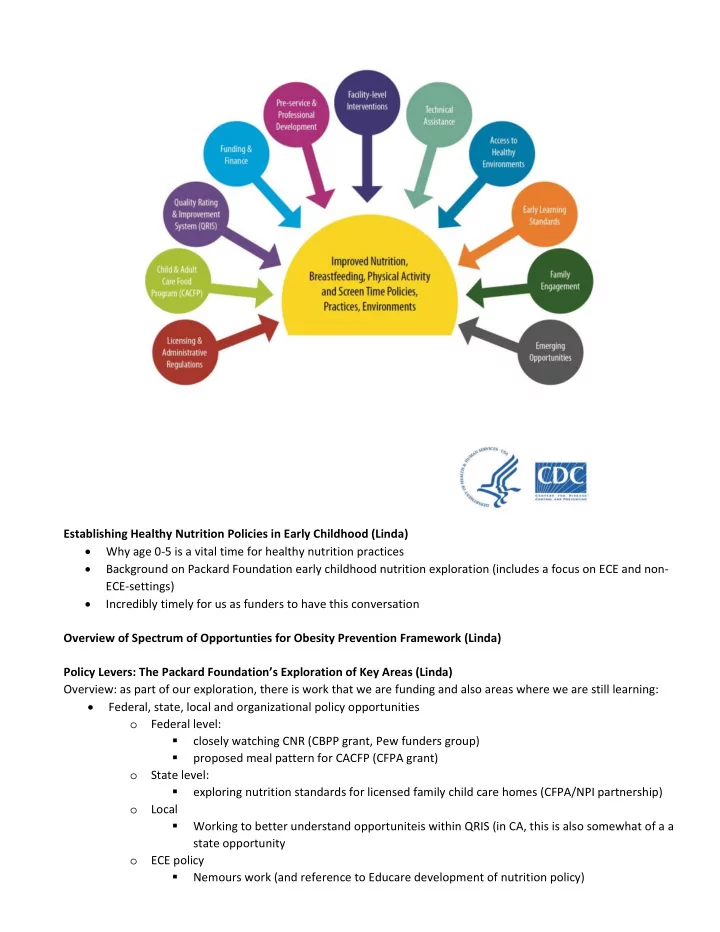

Establishing Healthy Nutrition Policies in Early Childhood (Linda) Why age 0 ‐ 5 is a vital time for healthy nutrition practices Background on Packard Foundation early childhood nutrition exploration (includes a focus on ECE and non ‐ ECE ‐ settings) Incredibly timely for us as funders to have this conversation Overview of Spectrum of Opportunties for Obesity Prevention Framework (Linda) Policy Levers: The Packard Foundation’s Exploration of Key Areas (Linda) Overview: as part of our exploration, there is work that we are funding and also areas where we are still learning: Federal, state, local and organizational policy opportunities o Federal level: closely watching CNR (CBPP grant, Pew funders group) proposed meal pattern for CACFP (CFPA grant) o State level: exploring nutrition standards for licensed family child care homes (CFPA/NPI partnership) o Local Working to better understand opportuniteis within QRIS (in CA, this is also somewhat of a a state opportunity o ECE policy Nemours work (and reference to Educare development of nutrition policy)
The MO “Spectrum of Opportunities” (Megan) Professional Development & Technical Assistance : Nemours Early Care & Education Learning Collaborative ECELC model overview Program outcomes (child care facilities) and impact (on statewide obesity efforts) CACFP & Facility Level Interventions CACFP voluntary state certification programs: Eat Smart, Move Smart, Breastfeeding Friendly MO Accreditation – inclusion of the Eat Smart criteria in the state accreditation standards Facility policy adoption re: nutrition, physical activity and breastfeeding MO Child Care Policy Background Licensing Rule Changes: Anti ‐ regulatory state, incremental rule changes, arduous process QRIS: Politically contentious process, just established process/committee to explore MO QRIS system MO Licensing and Administrative Regulation Challenges State budget cuts – Section for Child Care Regulation (SCCR) lost staffing New Child Care Development Block Grant (CCDBG) regs are SCCR priority Anti ‐ regulatory sentiments from child care community and elected officials Perception that new regs are a threat to facilities bottom line Opportunities Missouri Children’s Service Commission, Sub ‐ Committee on Childhood Obesity – recommendations to update licensing rules MO Childhood Obesity Summit April 2015 advanced public involvement in recommendations MO Council on Activity Nutrition and Activity (MOCAN) planning and brainstorming Integrating CCDBG efforts Integrating new CACFP rules Integrating YMCA HEPA Standards The MO Plan Building political will with key constituencies: o Engaging stakeholders to align efforts, prioritize policy changes and identify resources to feasibly adopt new policy/regs o Engaging child care staff and consumers (families) as advocates for policy change Strategies: Statewide survey of state experts, child care staff/admin; roundtable conversations with aforementioned constiutancies to refine prioity policy changes based on three criteria 1) impact on childhood obesity 2) enforcability/feasibilty 3) cost ‐ effectiveness Reccomendations/Lessons Learned CCA ‐ MO o Diffusion of Innovation Theory: Child care program/facility ‐ level interventions are key to 1) incentivizing best practice for “innovators” and “early adoptors” 2) dissiminating the “innovators” best practices 2) equipping “early adopters” with knowledge and resources o Programs that don’t fall into these catagories may be less resourced due to compounding factors: serving families that are high ‐ need and lower income, these families receive state subsidy which doesn’t cover the full cost of the program’s operation, resulting in lower pay/less staff, more stressful conditions, and higher staff turnover and, even if they are on the Child and Adult Care
Food Program (CACFP), reimbursement rates force them to choose cheaper (often less healthy) food options. It’s the families that are served by these programs that are disproportiantely effected by obesity and related health concerns. o Enhanced regulations can be a means to raising the bar for all licensened programs, but adequate training and hands ‐ on support is required to ensure that improved standards are implemented in the least burdensome way and don’t result in licensed programs loosing licensing status and serving families under the radar in unregulated environments. Packard Foundation o This work requires comprehensive solutions that include policy AND program (including programming for children and capacity building/ta for staff). Ideally as funders we are thinking about this work in a comprehensive way—policy, TA for staff, parent/family engagement, embedding nutrition into curriculum o ECE interventions don’t reach all kids (especially younger and lower ‐ income): share Foundation’s efforts to understand role of Informal Care o Work to be done engage ECE stakeholders (including funders) in making the case for why nutrition needs to be central to their efforts to improve quality of ECE settings, instruction and capacity building. As health funders, we need to also be talking about the brain science and the benefits of early nutrition on cogntive development
Recommend
More recommend